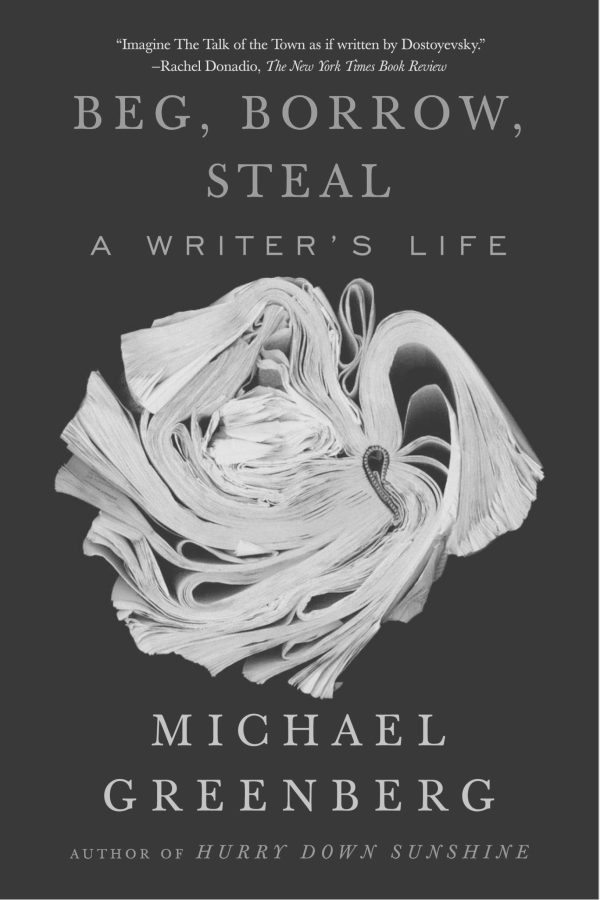Street sweepers grind down Broadway, driving rats back into their burrows for a few hours during New York City’s 4 AM face-lift. As the streets empty of taxicabs, drunken yuppies, students and go-go boys, off to an after-after-hours party at someone’s apartment, they are steadily replaced by a world of electrical workers, trash collectors, and sewer inspectors. Orange cones come out, and cops meander various street corners. Solemn bustle ensues as a new shift of New Yorkers take over the city. The shear range of personalities and activities overwhelm outsiders like me. Writer Michael Greenberg captures this constant animation and highlights its nuances in his book Beg, Borrow, Steal: a Writer’s Life, released in September of 2009. In forty-four short chapters, Greenberg creates a sardonic yet moving mosaic of the apartments, the mad houses, the graveyards, the two markets, the transvestites, and the train cars of New York City. Each wincingly witty anecdote draws a magnitude of meaning from the minute, ignorable clefts in the city’s fabric. It’s like being in the movie Antz, the center child in a family of one thousand, Greenberg says in his book. He portrays all of New York as his kin, and it’s easy to believe him. “It’s really a collection of short stories,” he said, kicking off a reading at the UMB bookstore last week. Most of the stories are revised versions of essays from Greenberg’s column in the Times Literary Supplement, which he wrote from 2003 until April 2009. “My editor told me to spill a drop of blood in everything I write . . . Of course he meant my blood, not other people’s blood . . . But sometimes I think I may not just spill my own,” he observed. Several of his stories offer disturbing glimpses into how writing affects his personal life and relationships. “People don’t like to see what they look like to other people,” Greenberg said, and began reading a story about his ex-friend and landlord. The book weaves through personal reflection, glancing allusions to novels and literary figures, and jarring tales of miscreants. Half the time he is one, missing some large pay-off. Like an aspiring con man with an honesty problem, he lets hundreds of thousands of dollars slip through his hands. “I remember the origin of the term confidence man.” He writes. “A well-dressed individual approached a stranger on the street: ‘Do you have enough confidence in humankind to let me hold your watch?’ he asked. When handed the watch, the man walked away with it.” So ends the last paragraph of the 23rd story in the book. Not only do stories about con artists take up the center section of Beg, Borrow, Steal, but cons pop up in the most unexpected places throughout the book, from a government con pulled on him while he lived in Argentina to a con he pulls on an owl watcher in central park. His tales about his misguided work ethic fashion a pessimistic portrait of a working writer in New York. And he is obsessed with rats. “Freud once remarked that when rats appear in dreams, they represent your siblings,” he said in an interview published before the release of his book. “When I catch sight of a rat skittering along the street, disappearing into a crack in the pavement, I see a representation of the life I had to leave.” He left his home and his inheritance, his father’s scrap metal yard, before he turned 18 and, determined to become a writer, he ignored all else, methodically decimating against chances of developing any other marketable skills. Writers write, he thought, and he barely made a living. When someone asked Greenberg after the reading if he ever considered turning any of the individual stories in the book into a novel, he replied, “I think each story stands on its own. In my column it was a challenge to condense everything into 1200 words. Usually I’d write four or five thousand, and find the story within that . . . Making a novel would be a completely different task.” Then he smiled and smoothed back the stray hair at the top of his head that had harassed him throughout the reading. Greenberg’s first novel, Hurry Down Sunshine, a memoir about the summer his fifteen-year-old daughter “cracked-up” as he put it, describes bi-polar disorder and a family’s attempt to cope in the midst of a mental breakdown. The book received excellent reviews. It was chosen as one of the best books of 2008 by Time. Some critiques say Greenberg is a writer that experienced forty years of writer’s block. And perhaps writing is a genetic gift. But to hear Greenberg describe his work, he has earned his time in the spotlight slaving over endless manuscripts in boring hack-writing jobs while working as everything from a waiter to a street salesman to pay his bills. His journey from publishing his first poem at 16, through writing screenplays that never became movies and the voice over for a golf documentary (he had never played golf at the time), to writing for O magazine and finally the Times Book Review in England, took forty two years. “I wouldn’t suggest using that strategy yourself,” he said, with a wolfish glimmer in his eye. “But it’s worked for me.”Both of Michael Greenberg’s books are available at the UMB bookstore. Beg, Borrow, Steal costs $19.95, and it’s worth the price. Don’t be stingy.price. Don’t be stingy.
Tales from A Conscientious Conman
March 25, 2010
About the Contributor
Caleb Nelson served as the following positions for The Mass Media the following years:
Editor-in-Chief: Fall 2010; 2010-2011; Fall 2011
News Editor: Spring 2009; 2009-2010





















































